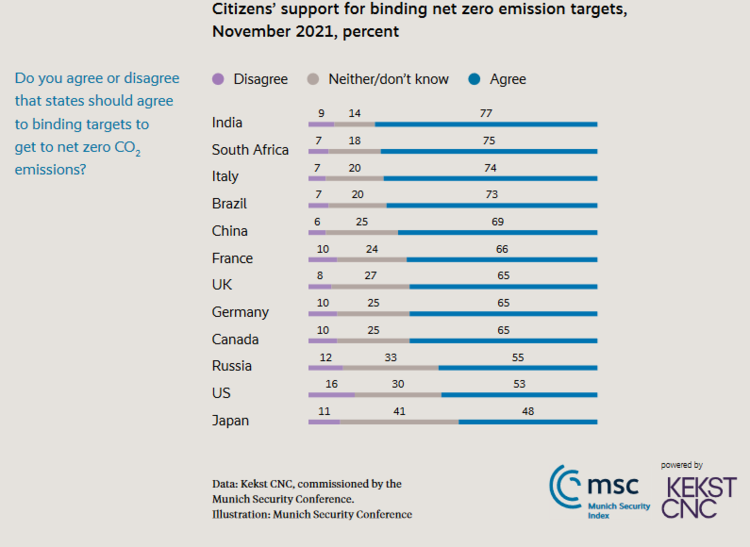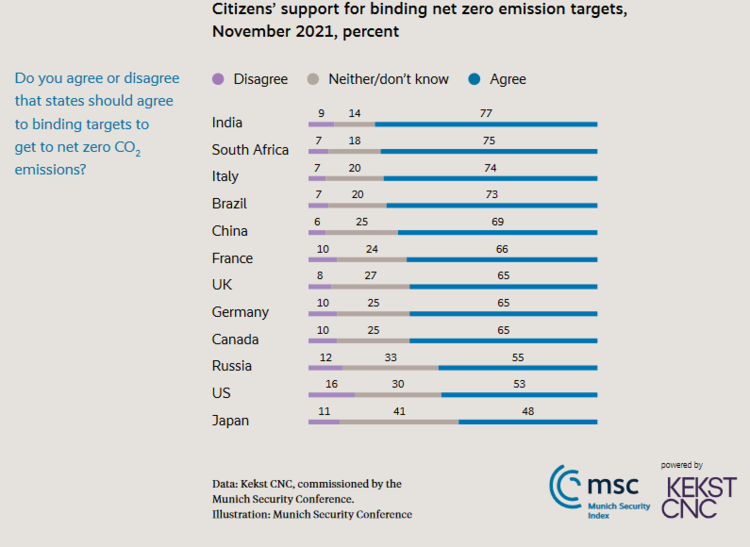( Clean Energy Wire ) – The “increasingly tangible” threat of climate change and other risks at a global scale, such as the coronavirus pandemic or geopolitical tensions in many regions, are spurring a sense of “collective helplessness” in societies around the world, the Munich Security Conference’s (MSC) 2022 report has found.
“Liberal democracies appear to feel particularly overwhelmed,” the report said with a view to the MSC’s Security Index based on polls conducted in different countries, warning that this development is “highly dangerous” and could “turn into a self-fulfilling prophecy” as apathy takes over. Extreme weather events, such as the floods in Germany and other western European countries in the summer of 2021, wildfires in the U.S. and Brazil or droughts and heatwaves elsewhere, “have driven home the message that the effects are already here – and will increase for decades,” the report said, adding that the responses given by governments worldwide are generally perceived as inadequate and “too little, too late” given the dire outlook and urgent calls for action by scientific analyses like the UN’s IPCC report.
The Munich Security Report pointed to surveys in Germany finding that over half of the people believe or even are completely sure that international efforts to curb global warming are bound to fail, while only a tiny fraction is truly optimistic. The level of scepticism was also high in other countries surveyed, such as Italy, Brazil, France or Japan, and generally has grown with respect to last year’s index, with the perception of a “seeming inevitability of climate change” gaining ground. The erosion of trust in people’s own governments and that of the international community to deliver meaningful action is contributing to “the greatest collective-action challenge we have ever faced,” the MSC concluded.
But the report stated that there is also reason for optimism: “As the response to the pandemic has shown, the world’s democracies can still muster enormous resources if need be – so we can surely do the same for addressing climate change as well.” Scientists continue to believe there are ways to keep global warming in check and “while democracies need broad support in this regard, they can still lead the way in this fight.” Risks from climate change and environmental degradation more broadly dominated the index and ranked high in each country surveyed. A majority in most countries agreed to the statement that binding climate neutrality targets are needed for every country in the world.
The MSC’s findings chime with the results of a study by the German science platform for climate action, WPKS, which analysed the potential for encouraging citizens and businesses to focus on the opportunities and attainable goals of climate action. „It’s important to understand that the euphoria about change that many supporters of climate policy feel strongly is increasingly met with scepticism,” said Fritz Reusswig from the Potsdam Institute for Climate Impact Research (PIK), one of the study’s authors.
Growing parts of society could rather be characterised as “tired of change” or even feel anxious about the idea, he said. A possible way to get more people on board regarding the chances and feasibility of emissions reduction, especially municipalities and smaller businesses could play an important role in communicating what can be achieved through climate action, the study found.
Licensed under a “Creative Commons Attribution 4.0 International Licence (CC BY 4.0)” .




 © 2025 All Rights Reserved
© 2025 All Rights Reserved